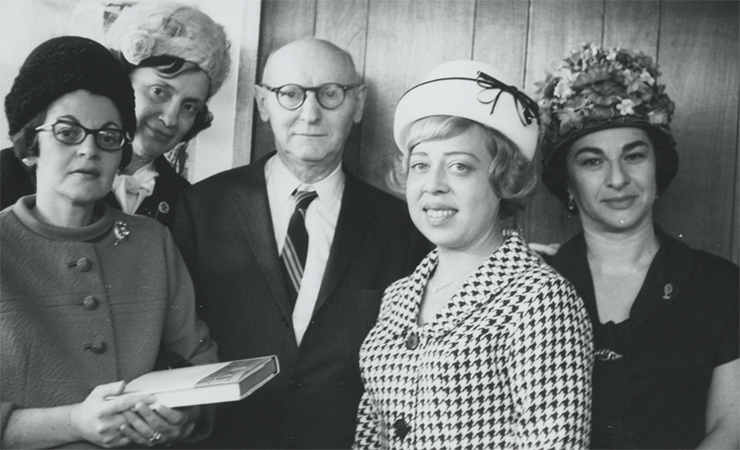
New York Jewish Film Festival Opener: “The Muses of Isaac Bashevis Singer”
Some of the women are unwittingly hilarious. Plenty are vain, lamenting their lost beauty. (Photos document their earlier charms.) Not all the “translators” spoke Yiddish. Singer would read his work to them in his own translations, and they would improve it.
He doesn’t seem to have ever credited his translators for his success, and his muses remained unsung. But without the English translations, Singer, who wrote only in Yiddish, would probably not have received the 1978 Nobel Prize for Literature.
Singer arrived in the U.S. from Warsaw in 1935 with $50 and the manuscript of his novel. He left a wife and son in Poland and never looked back. Decades later, his son finally came to New York to meet him. We see shots of father (diminutive) and only child (hulky kibbutznik) on the sidewalks of New York. His son wanted a father. What he got was some translation jobs.
Alma Singer – the woman who got and more-or-less kept Singer, left a husband and three young children for him. Once married, Singer continued to cultivate his harem of translators, and Alma, ever perfectly groomed, was, according to her niece, “very, very jealous, and she was right.” In fact, a surprise revelation near the film’s end, she was also one of Singer’s translators.
Somehow the little man, in dark hat and jacket, white shirt, vulnerable in his complete baldness and apprehensive blue eyes, continued to charm, shamelessly. He happily enhances his reputation, saying “‘Thou shalt not commit adultery’ is one commandment that needs a little correction.”
His last translator, Duba Leibell, working with him in Miami, describes Singer as a decrepit but very frisky old man. We see him bedridden but still impeccably dressed in a white shirt. To get him going on a short story, Leibell would make up little porno scenes: “Isaac Bashevis Singer gets into the elevator with a redhead and he fucks her.” Singer would insist that more character development was needed.
The last scene is truly Singer’s earthly paradise. In Sweden, he is addressing an audience of 1,200 Swedish librarians, all women. He looks out on this sea of women, shelves his plan to read from his work, and spends an hour and a half talking about how books and librarians saved his life and about his love of writing. They wouldn’t let him go. Maybe Singer added a room in paradise for a thousand Swedish librarians.
So there you have it – one Polish-Jewish-American man’s image of paradise brought to us by two Israeli men.
What’s missing emerged from the post–screening Q&A with the two directors. Festival director Aviva Weintraub of the Jewish Museum made the point that the translations of Singer’s works were not verbatim. The women were also creating. Among the translators, were there any who hated him? According to the directors, no, they all loved him.
A blonde in a red sweater in the audience tells otherwise. She was the one in the early film clip who asks Singer, “Why do you write in Yiddish?” From her description, it sounds like Singer used her like a convenience stop. He’d plop himself down at her place, which was near his publisher, Farrar Straus Giroux, and he sent her up to his apartment on the Upper West Side to see if Alma looked good before an event. (Of course she did.)
He disappeared on his first wife and son. He probably pulled a vanishing act on his translators, but the film doesn’t go there. In paradise, no answers are needed.
The Jewish Museum and Film Society of Lincoln Center’s two-week multi-national extravaganza runs night and day through Jan. 29. Program online at www.nyjff.org. Do not hesitate—many films are already sold out.
2 comments on “New York Jewish Film Festival Opener: “The Muses of Isaac Bashevis Singer””
Comments are closed.




Translating has often served as a euphemism for rewriting, and a cover for serious intellectual exploitation.. Check out Louis Ginsburg’s relationship with Henrietta Szold. And for a truly profound take on Singer and his translators, read Cynthia Ozick’s brilliant novella, ENVY OR YIDDISH IN AMERICA. The audio version by Ron Rifkin is great too.
Previous month check i got was 5000 dollars for working 12 hours weekly
doing a home-based job. My sister has a friend who has been averaging
11k monthly for some time now and she is working about 20 h weekly. I
was amazed how easy it was after I tried it. This has endless
potential… Here is what i am doing>
See more here —–>>>>>>